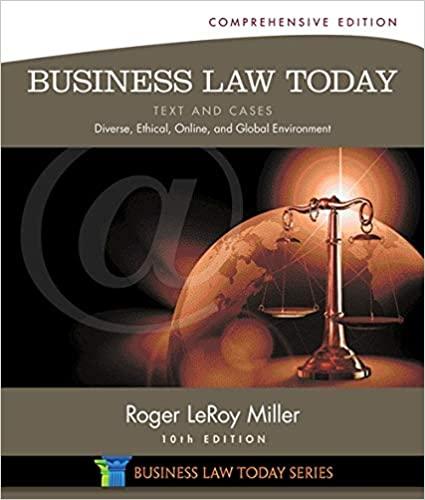Most business students must take a course in business communication. These courses cover the planning and preparation
Question:
Most business students must take a course in business communication. These courses cover the planning and preparation of oral and written communications, including e-mails. E-mails have become pervasive in business settings. Indeed, an increasing number of contracts are created via e-mail.
Voluntary Consent and Mistakes
One possible defense to contract enforceability is a lack of voluntary consent, sometimes due to mistakes (see Chapter 12). Often, when a mistake is unilateral, the courts will still enforce the contract. Consequently, the e-mail communications that you create can result in an enforceable contract even if you make a typographic error in, say, a dollar amount.
If you are making an offer or an acceptance via e-mail, you should treat that communication as carefully as if you were writing or typing it on a sheet of paper. Unfortunately, many individuals in the business world treat e-mails somewhat casually. When you realize that you are creating an enforceable contract if you make an offer or an acceptance via e-mail, then you know that you have to reread your e-mails several times before you hit the send button.
The Sufficiency of the Writing In this chapter, you read about the Statute of Frauds. The legal definitions of written memoranda and signatures have changed in our electronic age. Today, an e-mail definitely constitutes a writing.
A writing can also be a series of e-mail exchanges between two parties. In other words, five e-mail exchanges taken together may form a single contract. (In the past, before e-mails and faxes, this rule applied to written communications on pieces of paper that were stapled or clipped together.) If one or more e-mails name the parties, identify the subject matter, and lay out the consideration, a court normally will accept those e-mails as constituting a writing sufficient to satisfy the Statute of Frauds.
The Importance of Clear, Precise E-Mail Language In addition to typographic errors, casually written e-mails may contain ambiguities and miscommunications. Nevertheless, those e-mails may create an enforceable contract, whether you intended to create one or not. Therefore, all of your business e-mails should be carefully written.
Question
1. Create a precise and informative subject line. Rather than saying “we should discuss” or “important information,” be specific in the subject line of the e-mail, such as “change delivery date for line portable generators.”
2. Repeat the subject matter within the body of the e-mail message. In the actual e-mail message, avoid phrases with indefinite antecedents such as “This is . . . .” Good business e-mail communication involves repetition of most of the subject line. That way, if your recipient skips the subject line, the message will still be clear.
3. Focus on a limited number of subjects, usually one. Do not ramble and discuss a variety of topics in your e-mail. If necessary, send several e-mails on several different topics.
4. Create e-mails that are just as attractive as communications written on letterhead. Obviously, e-mails that have no particular format, no paragraphs, bad grammar, misspellings, and incorrect punctuation create a negative impression. More important, if your language is not precise, you may find that you have created an enforceable contract when you did not intend to do so. At a minimum, use the spelling and grammar checkers in your word processing program.
5. Proof your work. This aspect of e-mail communication is so important that it is worth repeating. Proofreading your e-mails before you hit the send button is the most important step that you can take to avoid contract misinterpretations.
Step by Step Answer:

Business Law Today Comprehensive Text And Cases Diverse Ethical Online And Global Environment
ISBN: 9781285428932
10th Edition
Authors: Roger LeRoy Miller





